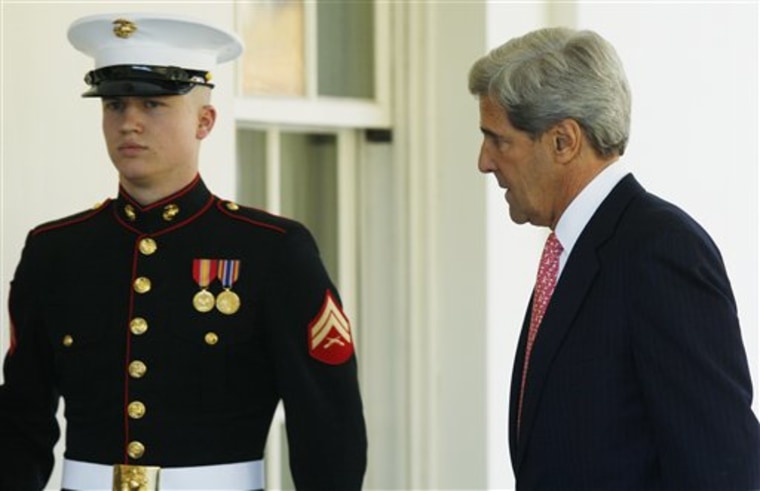He's not president, a Cabinet member or ambassador, but Sen. John Kerry has ascended to the unofficial role of President Barack Obama's global adviser on key issues that could reshape the nation's image around the world.
Mediating Afghanistan's presidential election vaulted Kerry from the already prominent chairmanship of the Senate Foreign Relations Committee into the most exclusive circle around a new president who is juggling but not resolved a variety of domestic and foreign policy matters. Beyond policy, Kerry knows how Washington works.
Kerry and Obama also share a political pedigree. Both were mentored by Sen. Edward M. Kennedy, who died in August.
"Obviously, Sen. Kerry is somebody who has a broad range of experience and an in-depth knowledge of issues, ranging form energy and climate change to health care to foreign policy," said White House Press Secretary Robert Gibbs. "I think it's that experience and insight that (Obama) certainly greatly values."
Obama's debut at Kerry's convention
That last bit cannot be overstated. Obama made his debut on the national stage at the 2004 presidential convention at which Democrats nominated Kerry to challenge George W. Bush's bid for a second term. Obama's speech electrified the party and the convention. It was the first time many Americans had heard of the young Illinois state senator.
"I'm here because of you," Obama wrote Kerry on the January day he was sworn in as the nation's first black president. The note is framed and hangs on Kerry's Senate office wall.
And now, Obama is leaning on Kerry to help shape his foreign policy. The two men met at the White House Wednesday just hours after Kerry returned from Afghanistan, where he played a crucial role in persuading President Hamid Karzai to accept a run-off vote after a fraud-plagued election.
The Massachusetts Democrat said he told Obama it wouldn't make "common sense" to decide whether more U.S. troops should go to Afghanistan without knowing the election results.
Kerry brushed off a question about how it felt to be the de facto secretary of state.
"That's an unfair characterization. I don't think it's appropriate, de facto whatever whatever," he said. Kerry called his participation in the talks an act of luck, in that he was in the region at the time on a fact-finding mission.
Secretary of State Hillary Clinton, Kerry said, "embraced" and encouraged his role in what became intensely personal and emotional talks with Karzai. Kerry said he was in touch with Clinton constantly while he was there.
"I thought it was important that I not take steps in some freelancing way," Kerry said. "She encouraged me to stay at it and to stay engaged in it and I think we worked as an effective team."
Still, observers said, Kerry's role as a presidential adviser on so many major domestic and foreign policy issues is unusual. Earlier this year, for example, Kerry helped reopen a U.S. dialogue with Syria in a meeting in Damascus for President Basher Assad
David Gergen, director of the Center for Public Leadership at Harvard, said that traditionally the chairman of the Foreign Relations Committee "stays at home and goes quietly on fact-finding missions.
"It's extremely rare that any president calls on an individual outside the executive branch to do as much representative work and diplomacy as Sen. Kerry," said Gergen, who served as an adviser to four presidents.
'Everyone's shortlist'
If Clinton leaves her position during the Obama administration, Gergen added, Kerry "would be on everyone's short list and probably right at the top of it as a potential successor."
For now, Kerry is content at the helm of one of the Senate's most powerful committees, in part because he's got so many other roles. He's vocal about Obama's top legislative priority, reforming the nation's health care system.
And he'll be out front in the debate over climate change legislation that would cut greenhouse gases 80 percent by 2050. There is pressure to make progress on the bill before international negotiations in Copenhagen in December. The first big meeting between Kerry, who introduced the bill this month, and administration officials took place over dinner in March at his Georgetown home.
If he had any doubts about his Senate role, an old mentor may have set them aside. Aboard the Mya, Kennedy's sailboat, in August, 2008, the stricken older senator noted that Kerry stands at the same point in his career in which Kennedy stood when he bowed out of the 1980 presidential race and returned to the Senate.
Revealing slip?
According to a Senate official with knowledge of the conversation, Kennedy told Kerry that he has decades of Senate service ahead of him if he wants it, and that without presidential ambition, no one can question Kerry's motives.
Still, Kerry has his hands in so many international issues that it's easy for some to forget that he's not part of the Obama administration.
Earlier Wednesday, Gibbs slipped during an off-camera briefing and called Kerry, "Secretary Kerry."
Gergen did the same thing during a telephone interview.
"See, we're all making that mistake," Gergen said.
More on: John Kerry
